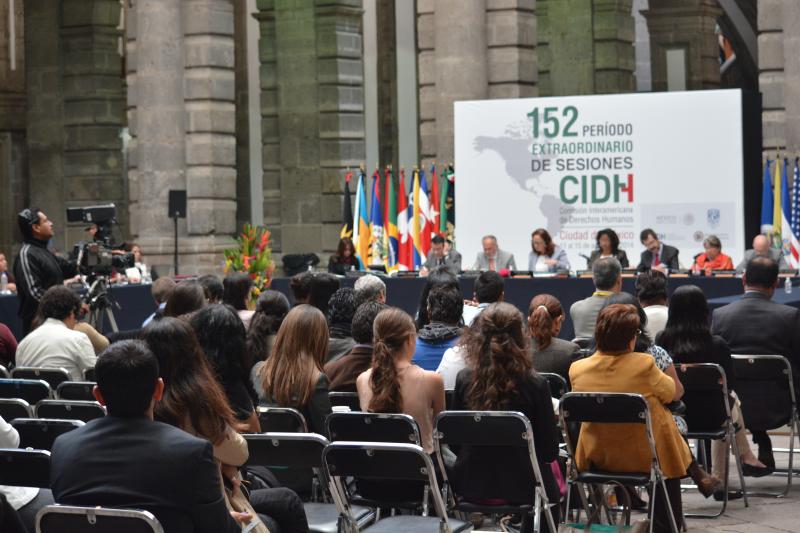






Washington, DC and Guatemala City, August 13, 2014. This year, important positions are up for renewal in the system of administration of justice in Guatemala, namely the position of the Attorney General and Public Prosecutor, as well as the members of the of the Supreme Court of Justice and the Courts of Appeals.
Unfortunately, the signing organizations consider that the Guatemalan State is not complying with international standards applicable to these types of appointments, which could compromise the principle of judicial independence that is fundamental in a democratic system.
In the Attorney General appointment process that was finalized in May 2014, the nominating committees (comisiones de postulación, CP) that evaluated the candidates acted with a broad margin of discretion that provoked, among other irregularities, an inadequate weighting of professional experience, a grave lack of justification on the relation between the applicants’ scores and those selected, and inexistent discussion on the honorability of the applicants as well as no evaluation of the negative challenges presented against some of the candidates.
More recently, in June the committees began the process of electing 13 members of the Supreme Court of Justice and 180 judges of the Courts of Appeals. Despite the importance of these appointments, the initial procedures have not been guided by the principles of independence, participation, transparency, disclosure and representativeness; on the other hand, the nominating committees have made decisions that raise doubts about the autonomy and impartiality of its members.
In its decision on June 13, 2014, the Constitutional Court (CC) showed some consideration about the importance of conducting an objective and reasonable evaluation, as well as to publicly, reasonably and expressly justify the vote that is cast in favor or against a candidate. Despite this, the CPs did not establish criteria to evaluate the constitutional requirement of “recognized honorability,” they approved ranking tables that only favored seniority in the length of experience working in the profession, but did not measure professional quality, they eliminated the possibility of conducting interviews of the candidates, and stated that their votes would be kept private, in open contempt for what was established by the CC.
Because of the irregularities stated above, the CC has granted two preliminary injunctions (amparo provisionales), the first submitted by the Convergence for Human Rights (Convergencia por los Derechos Humanos) and the second submitted by Deputy Ninth Montenegro, both ordering the CP to rectify its actions.
This past April the Inter-American Commission on Human Rights (IACHR) issued a statement on the proceedings taking place in Guatemala and reminded the State that, “the goal of any process to select and appoint justice operators must be to select candidates based on personal merit and professional qualifications, taking into account the singular and specific nature of the duties to be performed.” To accomplish this, the Commission considered that, “it is essential to have objective, pre-established criteria to assess and evaluate candidates, to prevent the discretion of the persons or bodies involved in the selection process.” These recommendations have yet to be fulfilled.
The described irregularities were exposed today in a public hearing before the IACHR by the Center for Justice and International Law (CEJIL), the Due Process of Law Foundation (DPLF) and Open Society Initiative (OSJI), in the 152nd Extraordinary Period of Sessions of the Inter-American Commission that took place in Mexico City.
The organizations also referred to the structural obstacles that prevent the eradication of impunity in Guatemala, in this sense, the continuation of the abusive practice of amparo resources and the complicity of authorities with the sole objective of delaying proceedings, the stalling of procedures by virtue of the defense that intends to apply the National Reconciliation Law to exempt alleged military authorities involved in massacres, forced disappearances and other grave violations from responsibility, and primarily the existence of a State policy that denies justice to victims.
The signing organizations express their concern for the clear disrespect of the State of Guatemala’s international commitments and join the voices of protest of civil society and other actors that call for transparent and objective election processes. The organizations make a respectful call to the competent authorities to rectify their actions and guarantee an independent administration of justice. It is only in this manner that progress can be made in overcoming the structural obstacles to eradicate impunity.
Lastly, the organizations congratulate the State of Guatemala’s invitation to receive the country rapporteur in an official visit and hope that the visit is conducted as soon as possible.
Signing organizations:
Centro por la Justicia y el Derecho Internacional (CEJIL)
Due Process of Law Foundation (DPLF)
Guatemalan Human Rights Commission
Open Society Justice Initiative (OSJI)
Plataforma Internacional contra la Impunidad
Press Contact
Daniela Araya
+506 22807473
¡Ayúdanos a continuar este trabajo crítico y urgente con una donación!
DONA AHORA